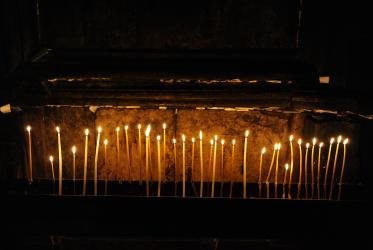Iglesia del Pakistán
The history of the churches in Pakistan is part of the history of Christianity in the Indian sub-continent. Their beginnings can be traced to the work of several Christian missions from the 16th century onwards. Pakistan came into existence when British rule ended on the sub-continent in 1947. The predominantly Muslim areas in the west and in the east became a separate state, with over a thousand miles of Indian territory in between. The eastern province broke away in 1971. The Church of Pakistan is the result of the union of four denominations: Anglican, Methodist, Lutheran and Presbyterian (Scottish), which took place in 1970. The United Presbyterian Church which had been involved in the negotiations did not join. Initially there were four dioceses in the Church of Pakistan, i.e. Karachi, Multan, Lahore and Sialkot, but in 1980, through a special resolution and for better ministerial work, four new dioceses were created: Hyderabad, Raiwind, Faisalabad and Peshawar. There are eight active diocesan bishops with an additional bishop for the Gulf Ministries. This appointment was made to take care of the pastoral and worship needs of Urdu-speaking workers in the Gulf. There is a presiding bishop for the Church of Pakistan who is known as the moderator and has responsibility for a three-year term. The United Church of Pakistan is the second largest church in the country after the Roman Catholic Church.
Christians form two percent of the population of Pakistan, which is approximately 140 million; 97 percent are Muslims. Christian scholars, teachers, social workers and lawyers are appreciated for their contributions, but face problems of identity and full participation in the social and political life of the country. There is no legal bar to evangelistic work, but the propagation of the gospel is not always welcomed. Most of the educational institutions like colleges and schools have been nationalized and operate under the control and direction of the government. The Church of Pakistan has initiated some significant steps to continue its role in education in the light of the policy of nationalization. Schools that were nationalized in 1972 have been returned to the church. The largest, Forman Christian College Lahore, was given back to the Presbyterian Church in 2003. It is hoped that in due course other colleges will also be returned. Outstanding institutions include United Christian Hospital, Gujranwala Theological Seminary, St Thomas Theological College Karachi, Edwardes College Peshawar, Mission Hospital Sahiwal and Kinnaird College for Women in Lahore.

